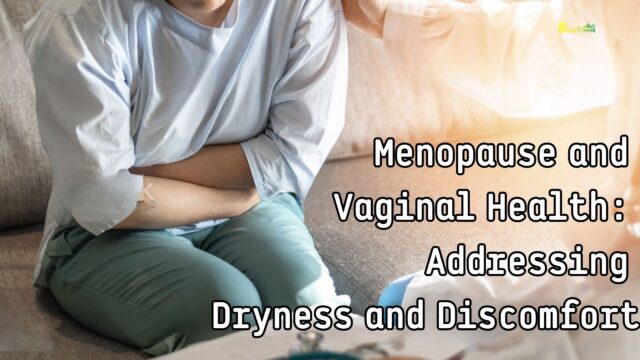Menopause is a stage of a woman’s life that naturally occurs at the conclusion of her fertile years. While childbearing causes many physical changes, one that frequently goes unseen but has a big impact on a woman’s quality of life is vaginal health. Low oestrogen levels during menopause can cause vaginal dryness, pain, and other associated symptoms. In order to assist women in maintaining their general well-being and sexual health after Menopause and Vaginal Health, this article will examine solutions to vaginal dryness and discomfort.
Understanding Menopause and Vaginal Health
When a woman’s ovaries stop producing eggs and her monthly periods stop, a normal biological process called menopause takes place. While it commonly occurs between the ages of 45 and 55, each person’s timing may differ. The body goes through many changes during menopause as a result of the decrease in oestrogen and progesterone levels, including vaginal dryness and vaginal wall weakening.
Common Symptoms of Vaginal Dryness and Discomfort
Several symptoms that might range in severity among women are brought on by vaginal dryness. These may consist of:
- A lack of lubrication and dryness
- Inflammation or itching in the vaginal region
- Stinging or burning feelings
- Dyspareunia: Pain or discomfort experienced during sexual activity
- Symptoms of the urinary system, such as frequent urination or recurrent UTIs
Causes of Vaginal Dryness during Menopause
The decrease in oestrogen levels is the main factor contributing to vaginal dryness during menopause. The vaginal tissues are kept moisturised and healthy by oestrogen. Reduced oestrogen levels cause thin, dry, and less elastic vaginal tissues, which exacerbate pain and other symptoms.
Lifestyle Changes to Support Vaginal Health
Women can adopt a number of lifestyle modifications to support vaginal health throughout menopause:
Stay hydrated: The vaginal tissues can stay hydrated generally by drinking plenty of water.
Use water-based lubricants: Using water-based lubricants during sexual activity can reduce dryness and improve comfort.
Avoid irritants: Certain items, including feminine hygiene sprays, douches, and scented soaps, might irritate the vaginal area. Instead, choose soft, odourless products.
Wear breathable underwear: To improve ventilation and lessen moisture buildup, choose cotton pants instead of tightly fitting synthetic materials.
Practice safe sex: Sexually transmitted infections (STIs), which can increase discomfort in the vaginal area, can be avoided by using condoms.
Over-the-Counter Remedies for Vaginal Dryness
Vaginal dryness can be temporarily relieved with over-the-counter medications. These consist of:
Vaginal moisturizers: Non-hormonal vaginal moisturisers can help replenish moisture and reduce dryness when used frequently.
Water-based lubricants: Before engaging in sexual intercourse, water-based lubricants can be used to lessen friction and improve comfort.
Prescription Treatments for Vaginal Dryness
Healthcare professionals may recommend hormonal or non-hormonal therapy for severe or chronic symptoms. These may consist of:
Hormone replacement therapy (HRT): Local or systemic oestrogen therapy can assist to replenish vaginal moisture and ease discomfort. It’s crucial to go over the potential advantages and disadvantages of HRT with your doctor.
Non-hormonal prescription treatments: Some drugs, like ospemifene, can help to alleviate vaginal dryness and lessen pain during sex.
Natural Remedies and Self-Care Practices
Some natural cures and self-care techniques in addition to medical therapies may offer relief:
Phytoestrogens: Due to their estrogen-like qualities, foods high in phytoestrogens, such as soy, flaxseeds, and legumes, may help reduce vaginal dryness.
Regular sexual activity: Self-stimulation or sexual activity can boost blood flow to the vaginal region, fostering natural lubrication.
Kegel exercises: Vaginal tone and suppleness can be increased by doing Kegel exercises to strengthen the pelvic floor muscles.
Communication with Your Healthcare Provider
It’s crucial to address your symptoms with your healthcare practitioner if you’re going through menopause and suffering dryness and discomfort in your vaginal area. Based on your medical history and preferences, they can assess your unique condition, offer pertinent advice, and recommend the best treatment alternatives.
Conclusion
The quality of life and sexual health of a woman can be greatly impacted by vaginal dryness and discomfort throughout menopause. Women might find relief and regain comfort by knowing the origins and symptoms and looking into different treatment options. In order to preserve overall vaginal health during the menopausal transition, addressing vaginal dryness is crucial. This can be done by lifestyle changes, over-the-counter medications, prescription therapies, or natural solutions.








